 Petzlover
Petzlover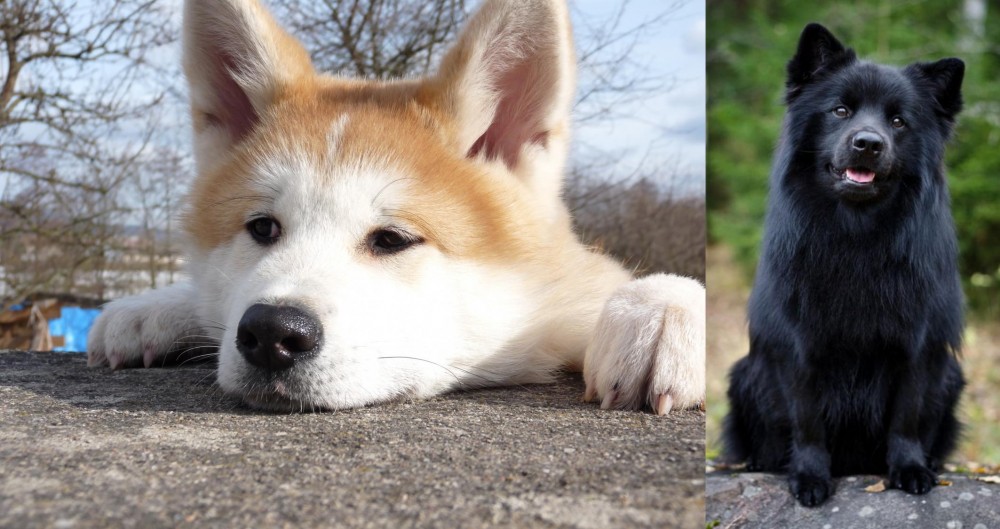 Akita is originated from Japan but Swedish Lapphund is originated from Sweden. Akita may grow 19 cm / 8 inches higher than Swedish Lapphund. Akita may weigh 33 kg / 73 pounds more than Swedish Lapphund. Both Akita and Swedish Lapphund has almost same life span. Both Akita and Swedish Lapphund has same litter size. Akita requires Low Maintenance. But Swedish Lapphund requires Moderate Maintenance
Akita is originated from Japan but Swedish Lapphund is originated from Sweden. Akita may grow 19 cm / 8 inches higher than Swedish Lapphund. Akita may weigh 33 kg / 73 pounds more than Swedish Lapphund. Both Akita and Swedish Lapphund has almost same life span. Both Akita and Swedish Lapphund has same litter size. Akita requires Low Maintenance. But Swedish Lapphund requires Moderate Maintenance
 Akita is a very old breed. The first information originates back in the 1600s. Akita was a royalty guard and a hunting dog. They were popular because of their bravery. Akita even attacked bears. Helen Keller brought the first Akita to America. She admired the breed because of the famous Hachiko, a dog that was known for his loyalty. Today, Akita is a popular dog in the whole world. They are lovely family pets, and if train properly they will be adorable part of any family.
Akita is a very old breed. The first information originates back in the 1600s. Akita was a royalty guard and a hunting dog. They were popular because of their bravery. Akita even attacked bears. Helen Keller brought the first Akita to America. She admired the breed because of the famous Hachiko, a dog that was known for his loyalty. Today, Akita is a popular dog in the whole world. They are lovely family pets, and if train properly they will be adorable part of any family.
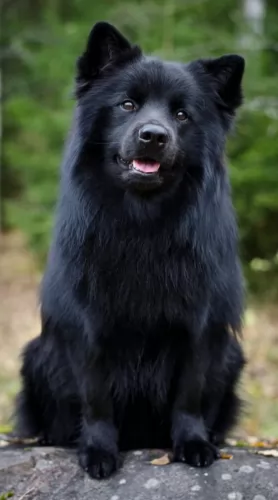 This is a Spitz type of dog from Sweden. It is Sweden’s national dog.The dog has always been used for herding and guarding livestock such as reindeer for the Sami people.
This is a Spitz type of dog from Sweden. It is Sweden’s national dog.The dog has always been used for herding and guarding livestock such as reindeer for the Sami people.
The dog is much the same as the Finnish Lapphund, and some even believe that it might be one and the same. The American Kennel Club recognizes them as two separate breeds.
It is one of the oldest Swedish dog breeds and also one of 3 Lapphund breeds.The Swedish Kennel Club recognized the Lapphund as a distinct breed in 1903.
The Federation Cynologique Internationale recognized this dog in 1944, and the United Kennel Club in 2006.
 Akita’s average weight is 34-54kg, while their height is 58-66cm. Females are smaller than males.
Lifespan variates from dog to dog but an average lifespan of Akita is 11-15 years. However, if you take care of your dog with a proper diet and regular vet checks they can live longer than average.
Litter Size of Akita is 7-8 puppies, but again, litter size variates because of dog’s genetics.
Other Names for Akita are Akita-Inu and Japanese Akita.
Akita’s average weight is 34-54kg, while their height is 58-66cm. Females are smaller than males.
Lifespan variates from dog to dog but an average lifespan of Akita is 11-15 years. However, if you take care of your dog with a proper diet and regular vet checks they can live longer than average.
Litter Size of Akita is 7-8 puppies, but again, litter size variates because of dog’s genetics.
Other Names for Akita are Akita-Inu and Japanese Akita.
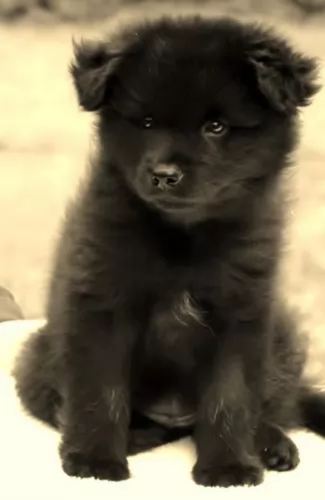 The Swedish Lapphund is a medium to large sized dog standing at between 40 to 51cm in height and weighing between 19 and 21kg.
The Swedish Lapphund is a medium to large sized dog standing at between 40 to 51cm in height and weighing between 19 and 21kg.
The head is wedge shaped and the ears erect. He has a thick double coat with fairly straight, silky hair that stands out from the body. Colors can be brown or black and sometimes there can be white markings. He sheds quite a bit, with some heavier seasonal shedding.
When you get one of these Spitz type dogs as your pet, you can be sure that you’re going to have an excellent pet and companion.
They’re independent dogs with strong wills and like to do their own thing. Training and socialization can change that and make him easy, well mannered and obedient.
They’re lively dogs and intelligent too. He is versatile, loving to be outdoors and being energetic with the children but being able to enjoy some quiet time indoors too. He is simply an excellent family pet and watchdog.
 Akita is a very elegant breed. They are very strong and fast, so they had been excellent guards. They sometimes can be stubborn, but they are very loyal to the family. Akita has tendencies to be aggressive to other dogs. Because of their dominant character, they can be especially aggressive towards the same sex. They are the best for one-dog houses. With family, they are very loving and gentle. The best way to train Akita is by positive training with awards. The old-fashioned way like punishing is not recommendable. Constant and firm training is important, so if you are first time owner, it might be a big challenge. If you are first time owner, consider advising with a trainer who knows the breed.
Akita is a very elegant breed. They are very strong and fast, so they had been excellent guards. They sometimes can be stubborn, but they are very loyal to the family. Akita has tendencies to be aggressive to other dogs. Because of their dominant character, they can be especially aggressive towards the same sex. They are the best for one-dog houses. With family, they are very loving and gentle. The best way to train Akita is by positive training with awards. The old-fashioned way like punishing is not recommendable. Constant and firm training is important, so if you are first time owner, it might be a big challenge. If you are first time owner, consider advising with a trainer who knows the breed.
Akita loves to be around family and to be included in family activities. They do not need a lot of activity, but daily routines of one-hour walks or jogging would be ideal for Akita. Visiting parks for dogs is not a good idea because of aggressive attitude towards other animals. If Akita does not have activities they can get bored, and you do not want bored Akita. When bored they start barking, digging, chewing, and sometimes even aggressive. Overall, they are very loving and gentle dogs who love to be around family and enjoy activities. But, they also need proper care and attention which require time and patience.
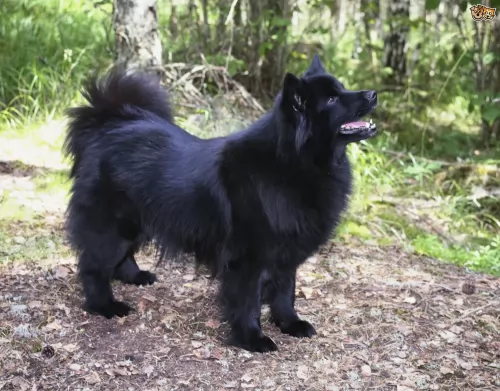 The Swedish Lapphund has always been a hardworking dog, herding reindeer for the Sami people.
The Swedish Lapphund has always been a hardworking dog, herding reindeer for the Sami people.
Today the Lapphund is a people-loving dog and wants to be constantly with his human family. He is intelligent, strong, independent, loyal, bold and loving. If you’re looking for an excellent family companion, this is it.
Do him a favor and don’t leave him outside without human companionship as he will become run-down and possibly destructive through no fault of his own. Bring him into your family and make him part of it and then he’s happy.
 Akita is a very healthy breed in general. Nevertheless, almost as every breed, Akita can develop health issues. Hip dysplasia, hypothyroidism, Progressive retinal atrophy are some of the issues Akita might have. Although, if you give your puppy Akita necessary vitamins, with a healthy diet and regular vet checks, it will a very happy and healthy dog. It is also important to know the genetics of your dog, so carefully choosing a puppy is very important.
Akita is a very healthy breed in general. Nevertheless, almost as every breed, Akita can develop health issues. Hip dysplasia, hypothyroidism, Progressive retinal atrophy are some of the issues Akita might have. Although, if you give your puppy Akita necessary vitamins, with a healthy diet and regular vet checks, it will a very happy and healthy dog. It is also important to know the genetics of your dog, so carefully choosing a puppy is very important.
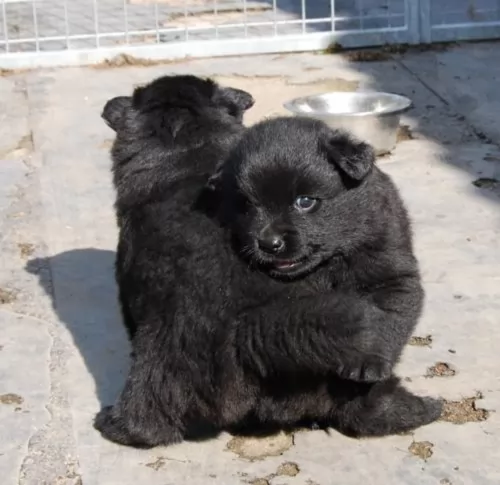 The Swedish Lapphud is a healthy dog breed, but even so he can get one of the many common dog illnesses there are.If you choose a puppy, make sure to get your pet from a reputable breeder to avoid more serious dog illnesses.
The Swedish Lapphud is a healthy dog breed, but even so he can get one of the many common dog illnesses there are.If you choose a puppy, make sure to get your pet from a reputable breeder to avoid more serious dog illnesses.
Diabetes Mellitus is a disease you might have to watch out for with this dog breed.
This is a disease of the pancreas. This organ has two groups of cells – one produces enzymes for proper digestion and the other produces the hormone insulin which regulates the level of glucose in the bloodstream.
Diabetes is when the pancreas fails to regulate blood sugar. Your dog will have increased thirst and urination, weight loss, and increased appetite.
Type I diabetes mellitus results from destruction of the insulin-producing beta cells, which is the most common type of diabetes in dogs. Dogs with this type of diabetes require insulin injections to stabilize blood sugar. Type II diabetes is more likely in older, obese dogs.
Dogs with diabetes mellitus will require insulin each day. If canine diabetes mellitus is properly regulated, prognosis for the dog is good.
 It is always important to adjust feeding to size, activity age and built. Dogs who are bigger and have more activity will need more food. For an average Akita 3-5 cups of dry high-quality food, divided into 2 meals will be enough. They also love to eat vegetables like carrots, broccoli, and fruits like apples, oranges, watermelon, etc.
It is always important to adjust feeding to size, activity age and built. Dogs who are bigger and have more activity will need more food. For an average Akita 3-5 cups of dry high-quality food, divided into 2 meals will be enough. They also love to eat vegetables like carrots, broccoli, and fruits like apples, oranges, watermelon, etc.
Akita puppy should have more meals per day plus additional calcium and vitamins. 3-5 meals per day would be an ideal for a puppy. It is a perfect way to develop your puppy into a healthy adult dog.
Grooming Akita is not the worst, but it will require some work. They have a double coat, but they are shedding a lot. Occasional vacuuming will be a new habit that every Akita owner needs. They shed 2-3 times per year, so it is not very bad. When it not shedding, everyday brushing would be a perfect way to groom your Akita.
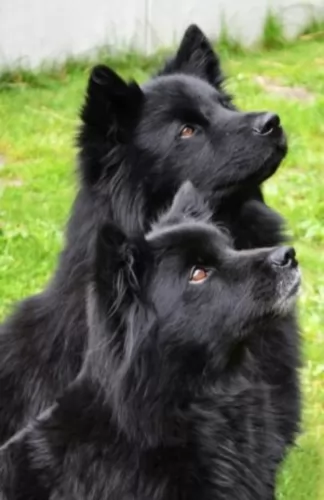 ●The Swedish Lapphund is an active dog and will require a high quality dog food. If you buy commercially manufactured dog food it should be appropriate to your dog’s age and activity levels.
●The Swedish Lapphund is an active dog and will require a high quality dog food. If you buy commercially manufactured dog food it should be appropriate to your dog’s age and activity levels.
Home-made food like boiled chicken, brown rice, spinach and sweet potatoes will do your pet the world of good, and chopped up, it can be added a couple of times a week to the dog’s dry kibble.
Try and feed some raw met occasionally as well. Clean, fresh water should be available at all times.
●The Lapphund is an active dog and he is going to reguire daily exercise that will keep him mentally and physically fit. Having a dog like this requires you being active yourself, and your Lapphund is going to love going on long walks or hikes. He will never get enough games with the children – he just loves the rough and tumble.
● Have his vaccines attended to. There are training classes as well as boarding kennels that won’t accept your dog unless his vaccines are up to date.
● Have your dog spayed or neutered if you don’t want your dogs to have puppies.
● Brush his coat twice a week. Check inside his ears and inside his mouth for redness and infection.